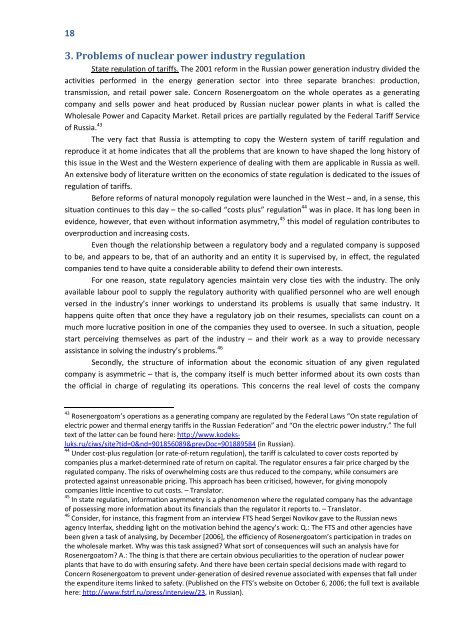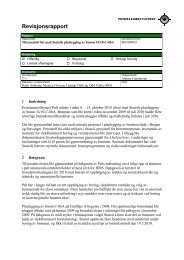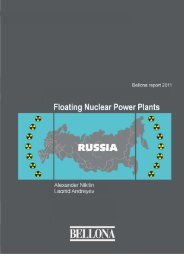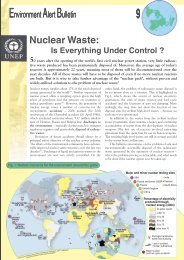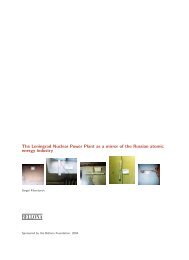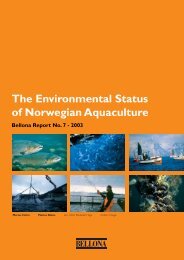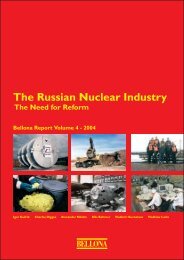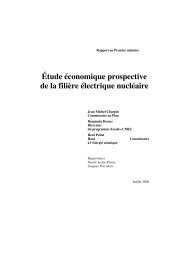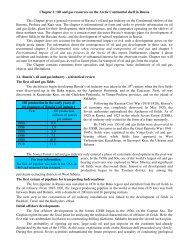183. Problems <strong>of</strong> nuclear power industry regulationState regulation <strong>of</strong> tariffs. <strong>The</strong> 2001 reform in <strong>the</strong> <strong>Russian</strong> power generation industry divided <strong>the</strong>activities performed in <strong>the</strong> energy generation sector into three separate branches: production,transmission, and retail power sale. Concern Rosenergoatom on <strong>the</strong> whole operates as a generatingcompany and sells power and heat produced by <strong>Russian</strong> nuclear power plants in what is called <strong>the</strong>Wholesale <strong>Power</strong> and Capacity Market. Retail prices are partially regulated by <strong>the</strong> Federal Tariff Service<strong>of</strong> Russia. 43<strong>The</strong> very fact that Russia is attempting to copy <strong>the</strong> Western system <strong>of</strong> tariff regulation andreproduce it at home indicates that all <strong>the</strong> problems that are known to have shaped <strong>the</strong> long history <strong>of</strong>this issue in <strong>the</strong> West and <strong>the</strong> Western experience <strong>of</strong> dealing with <strong>the</strong>m are applicable in Russia as well.An extensive body <strong>of</strong> literature written on <strong>the</strong> economics <strong>of</strong> state regulation is dedicated to <strong>the</strong> issues <strong>of</strong>regulation <strong>of</strong> tariffs.Before reforms <strong>of</strong> natural monopoly regulation were launched in <strong>the</strong> West – and, in a sense, thissituation continues to this day – <strong>the</strong> so‐called “costs plus” regulation 44 was in place. It has long been inevidence, however, that even without information asymmetry, 45 this model <strong>of</strong> regulation contributes tooverproduction and increasing costs.Even though <strong>the</strong> relationship between a regulatory body and a regulated company is supposedto be, and appears to be, that <strong>of</strong> an authority and an entity it is supervised by, in effect, <strong>the</strong> regulatedcompanies tend to have quite a considerable ability to defend <strong>the</strong>ir own interests.For one reason, state regulatory agencies maintain very close ties with <strong>the</strong> industry. <strong>The</strong> onlyavailable labour pool to supply <strong>the</strong> regulatory authority with qualified personnel who are well enoughversed in <strong>the</strong> industry’s inner workings to understand its problems is usually that same industry. Ithappens quite <strong>of</strong>ten that once <strong>the</strong>y have a regulatory job on <strong>the</strong>ir resumes, specialists can count on amuch more lucrative position in one <strong>of</strong> <strong>the</strong> companies <strong>the</strong>y used to oversee. In such a situation, peoplestart perceiving <strong>the</strong>mselves as part <strong>of</strong> <strong>the</strong> industry – and <strong>the</strong>ir work as a way to provide necessaryassistance in solving <strong>the</strong> industry’s problems. 46Secondly, <strong>the</strong> structure <strong>of</strong> information about <strong>the</strong> economic situation <strong>of</strong> any given regulatedcompany is asymmetric – that is, <strong>the</strong> company itself is much better informed about its own costs than<strong>the</strong> <strong>of</strong>ficial in charge <strong>of</strong> regulating its operations. This concerns <strong>the</strong> real level <strong>of</strong> costs <strong>the</strong> company43 Rosenergoatom’s operations as a generating company are regulated by <strong>the</strong> Federal Laws “On state regulation <strong>of</strong>electric power and <strong>the</strong>rmal energy tariffs in <strong>the</strong> <strong>Russian</strong> Federation” and “On <strong>the</strong> electric power industry.” <strong>The</strong> fulltext <strong>of</strong> <strong>the</strong> latter can be found here: http://www.kodeksluks.ru/ciws/site?tid=0&nd=901856089&prevDoc=901889584(in <strong>Russian</strong>).44 Under cost‐plus regulation (or rate‐<strong>of</strong>‐return regulation), <strong>the</strong> tariff is calculated to cover costs reported bycompanies plus a market‐determined rate <strong>of</strong> return on capital. <strong>The</strong> regulator ensures a fair price charged by <strong>the</strong>regulated company. <strong>The</strong> risks <strong>of</strong> overwhelming costs are thus reduced to <strong>the</strong> company, while consumers areprotected against unreasonable pricing. This approach has been criticised, however, for giving monopolycompanies little incentive to cut costs. – Translator.45 In state regulation, information asymmetry is a phenomenon where <strong>the</strong> regulated company has <strong>the</strong> advantage<strong>of</strong> possessing more information about its financials than <strong>the</strong> regulator it reports to. – Translator.46 Consider, for instance, this fragment from an interview FTS head Sergei Novikov gave to <strong>the</strong> <strong>Russian</strong> newsagency Interfax, shedding light on <strong>the</strong> motivation behind <strong>the</strong> agency’s work: Q.: <strong>The</strong> FTS and o<strong>the</strong>r agencies havebeen given a task <strong>of</strong> analysing, by December [2006], <strong>the</strong> efficiency <strong>of</strong> Rosenergoatom’s participation in trades on<strong>the</strong> wholesale market. Why was this task assigned? What sort <strong>of</strong> consequences will such an analysis have forRosenergoatom? A.: <strong>The</strong> thing is that <strong>the</strong>re are certain obvious peculiarities to <strong>the</strong> operation <strong>of</strong> nuclear powerplants that have to do with ensuring safety. And <strong>the</strong>re have been certain special decisions made with regard toConcern Rosenergoatom to prevent under‐generation <strong>of</strong> desired revenue associated with expenses that fall under<strong>the</strong> expenditure items linked to safety. (Published on <strong>the</strong> FTS’s website on October 6, 2006; <strong>the</strong> full text is availablehere: http://www.fstrf.ru/press/interview/23, in <strong>Russian</strong>).
19bears, how well <strong>the</strong>y are justified economically, what opportunities <strong>the</strong>re exist to cut down on <strong>the</strong>secosts or distribute <strong>the</strong>m between its regulated and unregulated activities, or spread <strong>the</strong>m over periods<strong>of</strong> time, etc.Several approaches have been worked out in literature dedicated to <strong>the</strong> issues <strong>of</strong> stateregulation to solve <strong>the</strong> problem <strong>of</strong> information asymmetry which have both been found useful inpractical application <strong>of</strong> state regulation principles abroad and have also been introduced into <strong>the</strong>current <strong>Russian</strong> legislation. <strong>The</strong>se are essentially assorted devices designed to obtain a more accurateidea <strong>of</strong> a company’s true level <strong>of</strong> costs and expenses. For instance, it is suggested to compare <strong>the</strong>regulated company in question with similar ones – a so‐called “yardstick regulation” 47 approach.<strong>The</strong>oretical knowledge that has been supported by empirical studies has shown that regulatedcompanies enjoy considerable latitude in manipulating <strong>the</strong> costs <strong>the</strong>y report to <strong>the</strong> authorities. In amajority <strong>of</strong> cases, a regulated firm has a stake in exaggerating its costs. In our case, we must assume amore intricate motivation at play.In order that <strong>the</strong> industry continue to receive state support and develop fur<strong>the</strong>r, it needs toassert its cost‐effectiveness compared with alternative sources <strong>of</strong> energy. This is why <strong>the</strong> costs that<strong>the</strong> nuclear industry reports to <strong>the</strong> regulatory agencies may be at any one level but <strong>the</strong>y will be lowerthan those incurred by using o<strong>the</strong>r energy sources.<strong>The</strong> nuclear industry, in o<strong>the</strong>r words, is not interested in disclosing all <strong>of</strong> its costs since some <strong>of</strong>its expenses are covered by state subsidies, including hidden ones. 48Of course, generation <strong>of</strong> electric power is not a natural monopoly and does not, <strong>the</strong>oretically,need price regulation. That regulation is maintained in its current form in <strong>the</strong> field <strong>of</strong> nuclear powergeneration does not so much reflect <strong>the</strong> desire to <strong>of</strong>fset monopoly pricing as it reveals <strong>the</strong> underlyinggoal to ensure guaranteed pr<strong>of</strong>it for <strong>the</strong> nuclear industry, as well as preserve <strong>the</strong> interests <strong>of</strong> <strong>the</strong>bodies that regulate it.Leniency in setting spending limits. It is <strong>the</strong> public, <strong>the</strong> society at large, that bears <strong>the</strong> economicconsequences for various investment decisions taken, paying <strong>the</strong> price if <strong>the</strong>se decisions have provenunwise. A private investor risks <strong>the</strong>ir own money and, by definition, will act under rigorous budget47 When utility suppliers do not face direct competition, regulators can put pressure on those firms by basing <strong>the</strong>irprices on <strong>the</strong> cost performance <strong>of</strong> comparable firms, a technique that provides companies with strong incentivesto cut costs and dampens <strong>the</strong> effect <strong>of</strong> information asymmetries between companies and regulators. From <strong>the</strong>Glossary <strong>of</strong> Regulation Terms, <strong>the</strong> Body <strong>of</strong> Knowledge on Infrastructure Regulation,http://www.regulationbody<strong>of</strong>knowledge.org/. – Translator.48 It is <strong>the</strong> funds that are allocated as part <strong>of</strong> <strong>the</strong> government target programme that ensure that new capacitiesare built, old nuclear power plants receive extensions on <strong>the</strong>ir engineered life spans, or uranium deposits aredeveloped, etc. <strong>The</strong> historical practice <strong>of</strong> close entanglement <strong>of</strong> civil and military goals, policies, and means toachieve <strong>the</strong> given objectives that <strong>the</strong> nuclear industry relies on enables its sector <strong>of</strong> commercial nuclear energy tothrive in a highly propitious environment incomparable with <strong>the</strong> conditions that exist for o<strong>the</strong>r power generationsectors. For instance, as per <strong>the</strong> “Programme <strong>of</strong> Activities <strong>of</strong> <strong>the</strong> State Atomic Energy Corporation Rosatom,” <strong>the</strong>corporation also performs <strong>the</strong> role <strong>of</strong> <strong>the</strong> state contracting agency and holds spending authority in administeringfederal budget funds in <strong>the</strong> following federal target programmes: “Development <strong>of</strong> <strong>the</strong> <strong>Nuclear</strong> Weapons Complex<strong>of</strong> <strong>the</strong> <strong>Russian</strong> Federation in 2007 to 2010 and for <strong>the</strong> Period until 2015,” “Ensuring <strong>Nuclear</strong> and Radiation Safety in2008 and for <strong>the</strong> Period through 2015,” “Industrial Decommissioning <strong>of</strong> Weapons and Defence Equipment (2005 to2010),” “National Technological Base in 2007 to 2011,” “Studies and Research in Priority Fields <strong>of</strong> Development <strong>of</strong><strong>the</strong> <strong>Russian</strong> Science and Technology Complex for 2007 through 2012,” “Development <strong>of</strong> <strong>the</strong> Military IndustrialComplex <strong>of</strong> <strong>the</strong> <strong>Russian</strong> Federation in 2007 to 2010 and for <strong>the</strong> Period until 2015,” “Development <strong>of</strong> <strong>the</strong>Nanotechnology <strong>Industry</strong> Infrastructure in <strong>the</strong> <strong>Russian</strong> Federation in 2008 to 2010,” and “Development <strong>of</strong> <strong>the</strong>Electronic Component Base and Radio Electronics in 2008 to 2015.” None <strong>of</strong> <strong>the</strong>se programmes have a directrelation to power generation, but <strong>the</strong>y provide funding to pay for, among o<strong>the</strong>r items, Rosatom’s administrative,educational, and research expenses, which would o<strong>the</strong>rwise have to be covered by revenue derived from sales <strong>of</strong>electric power.
- Page 2 and 3: …Nuclear power generation is the
- Page 4 and 5: Translator’s notes:Rules of etiqu
- Page 6 and 7: 6ForewordThe economy of the Russian
- Page 8 and 9: 8of everything that the nuclear pow
- Page 10 and 11: 10Real costs of nuclear power plant
- Page 12 and 13: 12Energy Potential Development,”
- Page 14 and 15: 14noticeably higher than the regula
- Page 16 and 17: 16came to 2.2 billion kilowatt‐ho
- Page 20 and 21: 20requirements: If a wrong decision
- Page 22 and 23: 22Property and liability insurance;
- Page 24 and 25: 24Depreciation 10,911,630 9,312,654
- Page 26 and 27: 26low prices, because a decrease in
- Page 28 and 29: 28Fig. 2. Spot prices for U 3 O 8 c
- Page 30 and 31: 30uranium needs and the demand it h
- Page 32 and 33: 32remains unclear what can be done
- Page 34 and 35: 34For instance, British energy comp
- Page 36 and 37: 36But Rosenergoatom’s real expens
- Page 38 and 39: 38contribution benefit plans, inclu
- Page 40 and 41: 40Table 11. Costs of decommissionin
- Page 42 and 43: 42And thirdly, traditional approach
- Page 44 and 45: 44The discount rate will be the var
- Page 46 and 47: 46Cost ofcapitalTable 15. Price of
- Page 48 and 49: 48operation as a baseload generatin
- Page 50 and 51: 505 percent0 percent367.0 614.3 3.7
- Page 52 and 53: 52The idea to develop the sector of
- Page 54 and 55: 54Even if we assume that the direct
- Page 56 and 57: 56Furthermore, the total cost of bu
- Page 58 and 59: 5811. Instructional guidelines for
- Page 60: 60Greenpeace, 01.04.2004,http://www


